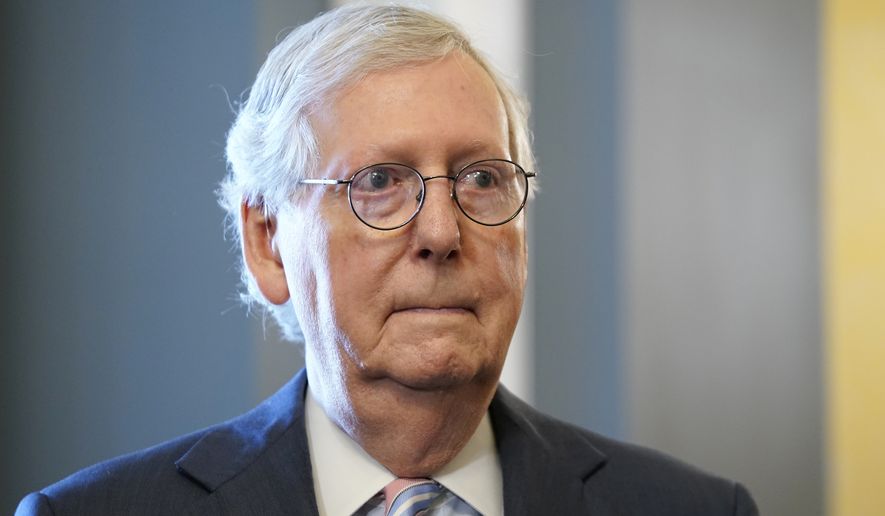Senate Minority Leader Mitch McConnell threw his weight Tuesday behind a bipartisan gun deal, buoying hopes for passage.
Mr. McConnell, Kentucky Republican, said he would be comfortable voting for the deal provided it did not change significantly from the framework announced Sunday that more than 20 lawmakers agreed to.
“For myself, I’m comfortable with the framework,” he said. “If the legislation ends up reflecting what the framework indicates, I’ll be supportive.”
Mr. McConnell is the 11th Republican to back the deal — an important number since most legislation requires at least 60 votes to pass the evenly split Senate. Furthermore, Mr. McConnell’s public backing is likely to reassure Republicans.
“It’s important for members to make their decisions based on the views of their states,” the minority leader said. “It’s a step forward on a bipartisan basis.”
The framework, which was negotiated by a core group of Democrats and Republicans, seeks to curtail mass shootings without infringing on the rights of law-abiding gun owners.
SEE ALSO: Bipartisan House bill offers new data privacy protections but faces big hurdle in Senate
Despite being incremental in nature, the package is still the most ambitious update of the nation’s gun laws in nearly a decade.
It boosts funding for school security and mental health treatment while providing financial incentives for states to adopt “red flag” laws that let courts prohibit people deemed threats from buying or possessing guns.
The deal also expands the background check system for gun purchases to include juvenile records and broadens restrictions on gun ownership for people accused or convicted of domestic violence.
“The bill itself will save thousands of lives,” said Sen. Christopher Murphy, a Connecticut Democrat who helped negotiate the package. ”This bill will make difference in the rates of violence in this country.”
Despite the support of Republicans like Mr. McConnell, the bill still faces obstacles to becoming law. Most of those are likely to arise as the Senate works to translate the framework agreement into legislative text.
“The details are still being worked out and that’s hard,” said Sen. John Cornyn, Texas Republican and another member of the bipartisan group. “I’m proud of the work we’ve done so far, but of course, we’re not at the finish line. We are still at the beginning when it comes to drafting [the] appropriate text.”
GOP lawmakers, in particular, are concerned that as the legislation is fleshed out it will become broad enough to ensnare law-abiding gun owners. Democrats, meanwhile, think the bill is already too watered down to have much effect.
Congress has faced such realities before, especially on the topic of guns. In 2019, former President Donald Trump failed to secure a deal on the topic after a spate of mass shootings in Texas and Ohio.
Former President Barack Obama similarly saw major gun legislation stall on Capitol Hill in 2012 after a gunman killed 20 children and six teachers at Sandy Hook Elementary School in Newtown, Connecticut.
Time is also a problem. Congress is scheduled to leave Washington for the July 4 recess at the end of next week.
Without a deal finalized by that time, the earliest lawmakers will be able to pass the gun deal will be the second week of July. Lawmakers fear that such a delay will give Second Amendment groups sufficient time to peel off GOP support.
Some also fear that other issues, including the Supreme Court’s long-awaited ruling on abortion, will suck up all political oxygen.
“We’re trying to seize the moment and the momentum,” said Senate Majority Whip Richard J. Durbin, Illinois Democrat. “So waiting runs the risk that some other critically important issue squeezes it off the calendar.”
• Haris Alic can be reached at halic@washingtontimes.com.




Please read our comment policy before commenting.